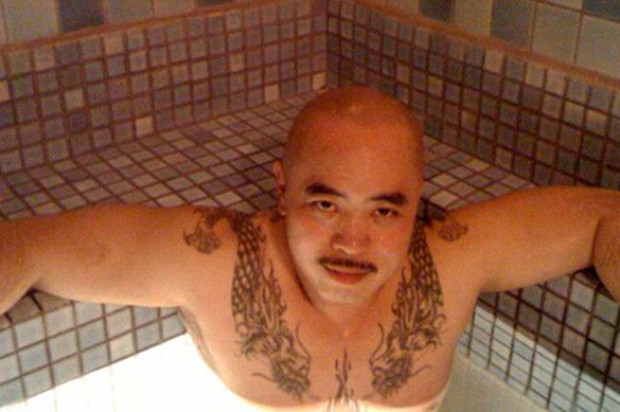
Raymond “Shrimp Boy” Chow, the leader of a Chinatown fraternal association, was convicted by a federal jury in San Francisco today on all 162 organized-crime counts lodged against him, including murder and racketeering conspiracy.
Chow, 56, was convicted of racketeering conspiracy in running an ongoing criminal enterprise and of the murder in aid of racketeering in 2006 of Allen Leung, Chow’s predecessor as leader or dragonhead of the Chee Kung Tong association.
He was also found guilty of conspiring to murder another rival, five counts of conspiring to receive and transport stolen liquor and cigarettes across state lines, and 154 counts of money laundering.
Chow will be sentenced by U.S. District Judge Charles Breyer on March 23. The murder in aid of racketeering conviction carries a mandatory life sentence.
The verdict came after two and one-half days of jury deliberations, following a two-month trial in Breyer’s Federal Building courtroom.
Chow became the dragonhead of the Chee Kung Tong several months after Leung was slain by a masked gunman in his Chinatown import-export office on Feb. 27, 2006. Prosecutors alleged Chow ordered the killing.
The defense contended Chow reformed after completing a previous federal racketeering and gun trafficking sentence in 2003, and became a charismatic community leader dedicated to helping Chinatown youth.
Prosecutors claimed Chow was a “ruthless, opportunistic thug” who ran a faction of the tong as an enterprise that included murder, drug dealing, trafficking in stolen goods and laundering the profits.
Defense attorney Tony Serra said Chow will appeal.
“The defense feels frustrated, agonized and outraged,” Serra said after the verdict. “We feel like we have been stabbed in the back by the jury.”
Serra said the conviction was “predicated on the testimony of five snitches that no rational human being would believe.” He said he blamed the jury for accepting the testimony of those witnesses, who included informants and codefendants who reached plea bargains with prosecutors and agreed to testify against Chow in hopes of receiving lighter sentences.
Serra said Chow was “noble” in accepting the verdict and told his attorneys, “We’ll win on the second round,” referring to the appeal.
Chow is one of 29 people who were indicted by a federal grand jury in 2014 after a four-year FBI undercover operation.
The indictment also included unrelated political corruption charges against former state Sen. Leland Yee, D-San Francisco/San Mateo.
Investigators were led to Yee through a probe of former San Francisco school board president Keith Jackson, a political consultant who had ties to the Chee Kung Tong and was also Yee’s fundraiser.
Yee and Jackson pleaded guilty last year to a separate racketeering conspiracy charge related to corruption, and Yee admitted accepting bribes in return for political favors. Breyer will sentence Yee and Jackson on Feb. 10.
Of the 29 people who were indicted, one has died and more than a dozen have pleaded guilty to various charges, including Yee, Jackson and seven tong associates who were originally scheduled to go on trial together with Chow.
The associates’ guilty pleas left Chow as the only defendant in the now-completed trial, which began on Nov. 9. A trial date for the remaining defendants will be set at a later time.
One of the key prosecution witnesses was an undercover FBI agent, known at the trial only by his pseudonym of Dave Jordan, who posed for four years as a Mafia member who wanted to work with tong members.
He testified that during those years, he gave Chow 26 or 27 envelopes of cash totaling $61,500 as payments for introductions to associates who would collaborate with him in carrying out money laundering and purchases and sales of stolen goods. The purportedly stolen whisky, cognac and cigarettes were supplied by the FBI.
Chow, who testified for three days in his own defense last month, said he believed the payments were gestures of love and respect and denied having anything to do with the two murders and the other crimes.
“I didn’t kill nobody,” he told the jury. Chow also testified that “I changed myself” and renounced crime after meditating at Ocean Beach in San Francisco for three days following his 2003 release from prison.
The charge of murdering Leung in aid of racketeering could have carried a potential death penalty, but U.S. Justice Department officials decided before the trial not to seek a death penalty. That decision left a mandatory sentence of life in prison as the penalty for the murder conviction.
In the second murder-related charge, Chow was accused of conspiring in 2011 and 2012 to murder Jim Tat Kong, a member of the Hop Sing Tong, an association affiliated with the Chee Kung Tong.
Kong was found fatally shot in his car in Mendocino County in 2013. Chow was not accused of causing his death, but rather of conspiring with an associate, Andy Li, to kill him a year earlier.
Li, who testified as part of a plea deal with prosecutors, told the jury that Chow asked him to “take care of Jimmy.” He said he planned to hire someone to kill Kong, but did not do so because in 2012 Chow told him, “Don’t worry, it’s been taken care of.”
Serra and fellow defense attorney Curtis Briggs said Chow’s appeal claims will include arguments that Breyer allegedly unfairly limited their number of witnesses and their cross-examination of prosecution witnesses.
Prosecutors said today the verdict was fair and vowed to continue investigating criminal networks in the Bay Area.
“This conviction represents a just and final end to Mr. Chow’s long running and deadly criminal career,” San Francisco FBI Special Agent in Charge David Johnson said.
“The FBI is dedicated to investigating and prosecuting violent criminal enterprises operating in the Bay Area and will continue to work closely with our state and local partners to make our communities and residents safe.”
Julia Cheever, Bay City News









